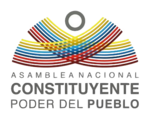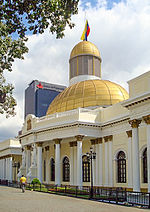Constituent National Assembly Asamblea Nacional Constituyente | |
|---|---|
 | |
| Type | |
| Houses | Constituent assembly |
| History | |
| Founded | 4 August 2017 |
| Disbanded | 31 December 2020 |
| Preceded by | 1999 Constituent Assembly |
| Leadership | |
President | |
First Vice President | |
Second Vice President | |
Secretary | Fidel Vásquez, PSUV since 4 August 2017 |
Undersecretary | Carolys Pérez, PSUV since 4 August 2017 |
| Structure | |
| Seats | 545 |
 | |
Political groups | Great Patriotic Pole (503)[1][2] Vacancies (42)[3] |
Length of term | 2 years, extendable (expires 31 December 2020) |
| Elections | |
| List and nominal vote by municipal and sectoral | |
Last election | 30 July 2017 |
| Motto | |
| Power of the People (Poder del Pueblo) Constituent of the Sovereign People (Constituyente del Pueblo Soberano) | |
| Meeting place | |
 | |
| Palacio Federal Legislativo, Caracas | |
The Constituent National Assembly (Spanish: Asamblea Nacional Constituyente; ANC) was a constituent assembly elected in 2017 to draft a new constitution for Venezuela. Its members were elected in a special 2017 election that was condemned by over forty mostly Latin American and Western states.[4][5][6][7][8] The Democratic Unity Roundtable—the opposition to the incumbent ruling party—also boycotted the election claiming that the Constituent Assembly was "a trick to keep [the incumbent ruling party] in power."[9] Since the opposition did not participate in the election, the incumbent Great Patriotic Pole, dominated by the United Socialist Party of Venezuela, won almost all seats in the assembly by default.[10][11][12]
After the assembly was elected, the body convened for the first time on 4 August 2017, despite criticism from the aforementioned parties and from the regional trade bloc Mercosur.[5][6][7][8][13] As part of it first acts, the assembly elected former Foreign Minister and Minister of Communication Delcy Rodríguez as its president, though she was appointed Vice President of Venezuela on 14 June 2018, and was succeeded by former Vice President Diosdado Cabello.[14]
On 8 August 2017, the Constituent Assembly declared itself to be the government branch with supreme power in Venezuela, banning the opposition-led National Assembly from performing actions that would interfere with the assembly while continuing to pass measures in "support and solidarity" with President Maduro.[15] On 18 August 2017, the Constituent Assembly gave itself the power to pass legislation and override the National Assembly on issues concerning "preservation of peace, security, sovereignty, the socio-economic and financial system"[16] and then stripped the National Assembly of its legislative powers the following day.[17] The opposition-led National Assembly responded, stating it would not recognize the Constituent Assembly.[18]
As of May 2019, the Constituent Assembly mandate was expected to expire on 31 December 2020.[19] On 15 December 2020, President of the Assembly Diosdado Cabello set a dissolution date for three days later on 18 December, arguing that the assembly had met all of its objectives except for that of creating a new Constitution.[20] On 18 December 2020, Maduro declared that the Constituent Assembly would close at the end of the year.[21]
- ^ Delcas, Marie (5 August 2017). "Au Venezuela, l'opposition dénonce 'l'installation d'une dictature'" [In Venezuela, the opposition denounces "the installation of a dictatorship"]. Le Monde (in French). Retrieved 5 August 2017.
- ^ "Resultados Electoral Constituyente 2017". National Electoral Council of Venezuela. Archived from the original on 19 August 2017. Retrieved 19 August 2017.
- ^ "ANC perdió al menos 40 de sus constituyentes". Aporrea (in Spanish). Retrieved 23 January 2018.
- ^ "La lista de los 40 países democráticos que hasta el momento desconocieron la Asamblea Constituyente de Venezuela" [The list of the 40 democratic countries that until now were ignored by the Constituent Assembly of Venezuela]. Infobae (in Spanish). 31 July 2017. Retrieved 1 August 2017.
- ^ a b "Venezuela: New assembly leader warns 'justice will come'". CNN. 4 August 2017. Retrieved 19 August 2017.
- ^ a b "As Venezuela unrest spreads, Maduro presses on with plans to rewrite charter". Reuters. 24 May 2017. Retrieved 24 May 2017.
- ^ a b "Venezuelan gov't proposes constitutional assembly election on July 30". EFE. 4 June 2017. Retrieved 6 June 2017.
- ^ a b "40 countries protest Venezuela's new assembly amid fraud accusations". Retrieved 4 August 2017.
- ^ "Venezuela opposition boycotts meeting on Maduro assembly, clashes rage". Reuters. 8 April 2017. Retrieved 7 August 2017.
- ^ Mogollon, Mery; Kraul, Chris (29 July 2017). "As Venezuelan election nears, more upheaval and cries of fraud". Los Angeles Times. Retrieved 30 July 2017.
- ^ "What are Venezuelans voting for and why is it so divisive?". BBC News. 30 July 2017. Retrieved 30 July 2017.
- ^ Bronstein, Hugh. "Venezuelan opposition promises new tactics after Sunday's vote". Reuters India. Archived from the original on 30 July 2017. Retrieved 30 July 2017.
- ^ Cite error: The named reference
waposwas invoked but never defined (see the help page). - ^ Cite error: The named reference
sacbeewas invoked but never defined (see the help page). - ^ Goodman, Joshua; Sanchez, Fabiola (8 August 2017). "New Venezuela assembly declares itself superior government branch". Chicago Tribune. Associated Press. Retrieved 9 August 2017.
- ^ Bronstein, Hugh; Symmes Cobb, Julia (18 August 2017). "Venezuela faces outrage after new assembly takes legislative power". Reuters.
- ^ Graham-Harrison, Emma; López, Virginia (19 August 2017). "President Maduro strips Venezuela's parliament of power". The Guardian.
- ^ "Asamblea Nacional reitera que no acatará sentencia de la Constituyente cubana" [National Assembly reiterates that it will not comply with the ruling of the Cuban Assembly]. La Patilla (in European Spanish). 19 August 2017. Retrieved 19 August 2017.
- ^ "Venezuelan constituent extends its operation until the end of 2020". La Vanguardia (in Spanish). 21 May 2019. Retrieved 21 May 2019.
- ^ "Cabello says the ANC fulfilled its task and will be dissolved on 18 Dec". Diario Panorama (in Spanish). 15 December 2020. Retrieved 21 December 2020.
- ^ "Venezuela's Maduro to shut all-powerful legislative assembly". Deutsche Welle. 19 December 2020. Retrieved 21 December 2020.